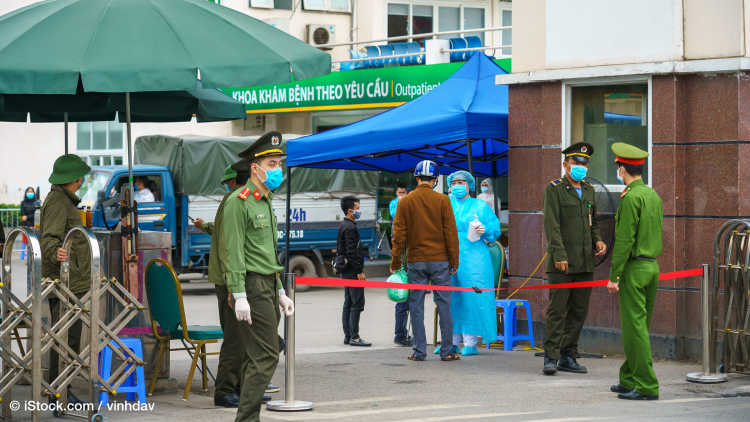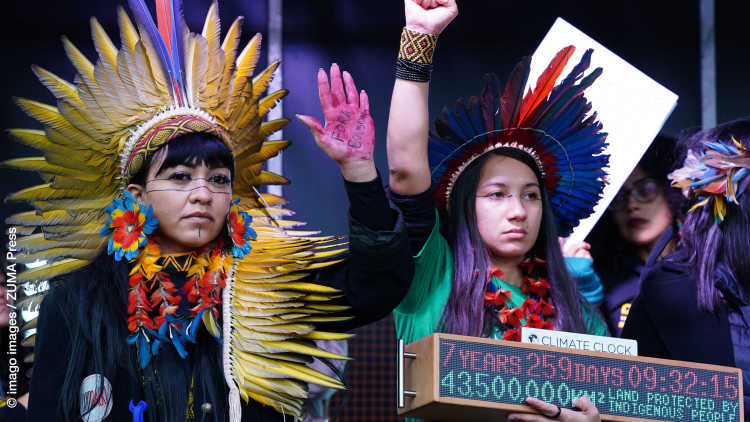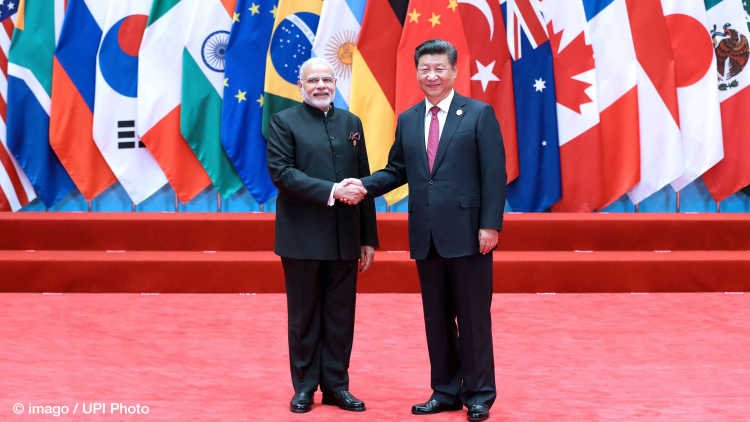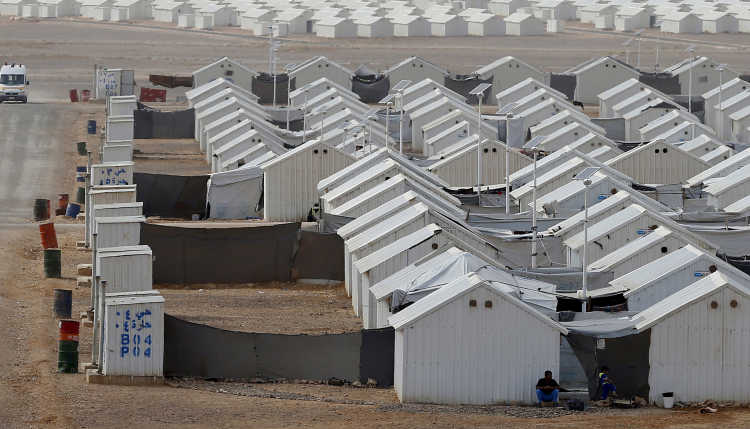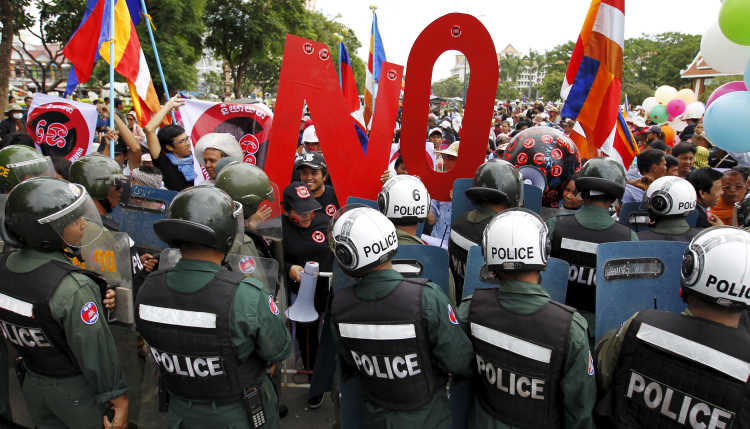- Startseite
- Publikationen
- GIGA Focus
- Blaming Nature: Legitimising the Mismanagement of Natural Resources
GIGA Focus Nahost
Blaming Nature: Legitimising the Mismanagement of Natural Resources
Nummer 7 | 2022 | ISSN: 1862-3611

Climate change is progressing fast and is undeniably a man-made disaster. Its impacts – heatwaves, floods, sea-level rise, melting ice caps, erratic rainfall, desertification, and similar – are likely to worsen in intensity and increase in frequency for many years to come. While the question of why measures to halt climate change are not fully implemented is not easily answered, it is necessary to reflect meanwhile on the strategies employed by governing actors to legitimise such inaction.
One such strategy is the attempt to ignore the “human” aspects of natural disasters, like bad governance and mismanagement, a process called “ecologisation.” Climate change lends itself easily to this.
By presenting drought, floods, and other extreme weather events as “natural” and thus “beyond our control,” governing actors can deflect responsibility for their mismanagement and bad governance regarding natural resources. This has happened in Syria, for example, following the prolonged drought occurring in the first decade of the twenty-first century.
Political Ecology provides key knowledge on how these problems can be constructed as “environmental” or “natural,” how such “environmental” situations can be positioned as unprecedented and disastrous, and how framings like these may support ulterior political goals.
Somewhat counterintuitively, it may be necessary to “de-naturalise” phenomena that have been attributed to climate change to uncover the broader sociopolitical impetuses behind them.
Policy Implications
With the fight over a possible trade-off between climate action and human rights already ongoing, policymakers need to learn how to both identify and address “ecologising moves.” One way of doing this is by strengthening civil society actors who are identifying and calling out such moves, often under existential threat.
The Concept of “Ecologisation”
Countering “ecologisation” starts from the assumption that events presented or “framed” as natural disasters are never exclusively “natural” but also result from human alterations of nature, especially in the Anthropocene – meaning the geological age in which human activity has become the dominant force influencing the Earth’s environment and climate. Extreme weather events in the natural environment are at least in part a hazard we ourselves have induced by co-creating the conditions under which they occur. The concept thus points to the old debate about the relationship between society and nature: On the one hand, human beings depend on natural-environment conditions and are an extremely vulnerable part of the biophysical system called Earth; on the other, our interaction with and utilisation of nature affects those same environmental conditions, often with unintended consequences. What is more, how a society relates to nature is necessarily led by cultural ideas, which in essence translate nature into symbols. Society–nature relations thus always have a material and symbolic dimension, and it is this dual quality that makes inquiries into environmental problems like natural disasters ambiguous and difficult.
The literature differentiates between local groups controlling collective resources at the expense of others (“politicisation”) and the framing of pre-existing conflicts as being about natural resources (“ecologisation”) (Robbins 2012). Uneven access to and responsibility for natural goods ensue from the ways in which labour and power are distributed in a society, making property systems complex “bundles of rights that are politically partial and historically contingent” (Robbins 2012: 173). In addition, assumptions and perceptions about intersectional traits like class, race, gender, ethnicity, and similar impact development activities – often resulting in poorly formed policies and uneven results.
Building on Robbins and drawing on the Copenhagen School’s “securitisation theory,” I propose that this process consists of “ecologising moves” that discursively reframe a phenomenon originally caused by sociopolitical conditions as being attributable to the natural environment instead, for instance via climate change. One example is how a prolonged drought in Syria in the first decade of the twenty-first century and ensuing internal migration have been framed as climate change-induced, while failing to pay equal attention to the decades of mismanagement of natural resources in the country (Selby et al. 2017). While it is undisputable that the severity and frequency of droughts is already increasing and will only do so further as climate change progresses, framing an event in such a way risks giving governing actors a free pass to relinquish their core responsibilities. I consider such ecologising moves a way of upholding a “regime of truth,” and “taken for granted dominant stories” (Robbins 2012: 70).
Thus, an ecologising move can be understood as a specific speech act, an utterance by which an issue is constructed as a “natural” event for a specific audience – this results in successful ecologisation when the latter concurs with this view. I further hypothesise that ecologising moves can serve to legitimise practices commonly existing outside of the “normal” policy repertoire, presenting their deployment as being part of responding to these “natural” events. These include the “silent violence” (Watts 2013) of malnutrition in the context of a “natural” disaster; the ways in which governing actors may utilise and control natural resources during such an occurrence, including the monopolisation of aid and the lack of its provision; and, the governance of people hereby displaced as a possible strategy of demographic engineering (Davis 2001).
Disentangling Ecologising Moves
What is “natural” about a disaster like a drought or flood, and about related effects like displacement, famine, or agricultural collapse? What part of such events is an “avoidable political tragedy” (Davis 2001: 8)? While drought and other extreme weather events are often framed as “natural” processes, governing actors also play a central role herein via their chosen courses of (in)action. This is particularly true in capitalist societies, where labour and land are turned into commodities. Different systems of production impact the environment in varying ways, and it is in this context that climatic factors need to be understood (García 1981). Crucially, absolute scarcity is rarely the issue in natural disasters. Instead, a state’s political will to address the situation at hand – for instance by alleviating crop failure and by mitigating drought effects – is key, as are the pre-existing vulnerabilities that make the impacts hereof even more acute.
Vulnerability is understood as an increased exposure to and reduced capacity to handle a given environmental crisis. The higher the degree of vulnerability, the greater the likelihood of severe consequences ensuing. But who is vulnerable, and why? Following Tyner and Rice, vulnerability (or rather, its production) can be understood as an act of violence – meaning
any action or inaction that affects the material conditions of another, and in so doing, reduces one’s potentiality to survive: or to put it another way, violence is any action or inaction that increases vulnerability. (Tyner and Rice 2016: 50)
This applies to the international level, where colonial legacies have contributed to countries in the Global South being more prone to climate change impacts, as well as to the state and sub-state levels, where already disenfranchised and marginalised groups are more vulnerable to disaster effects than others. In this understanding, ecologising a disaster can be a strategy to distract from the violent conditions dominant in a particular society.
Relatedly, Davis (2001: 12f) has outlined how natural disasters can be an opportunity for governing actors to strike out against unwanted groups or movements. Nixon even speaks about “ethnocide by environmental means” (Nixon 2013: 110). In such cases, an ecologising move – that is, framing a particular disaster and the resulting hardships as “natural” rather than as the result of bad governance – can be a tool to legitimise strategic indifference towards affected populations. This also highlights the role of intentionality, which Tyner and Rice (2016: 48) conceptualise as: a) having the ability to act but choosing not to; b) having the opportunity to prevent harm but choosing not to; and, c) being aware of one’s actions causing harm and continuing with them regardless. In the case of a natural disaster, governing actors can thus choose not to alleviate or prevent its effects despite having the ability and the opportunity to do so, and despite being aware of the consequences. It is even possible that such strategic indifference towards natural disasters could be a tool to enforce loyalty to an authoritarian regime or to decimate perceived enemies.
Drought in Pre-Revolutionary Syria
Much has been written about the drought period in Syria in the first decade of the twenty-first century and its possible connection to the uprising of 2011. Although the causal link between the drought, ensuing internal migration, and conflict onset is fuzzy and weak (Selby et al. 2017), the narrative of the drought being tied to the outbreak of the Syrian war has been repeated time and again by Western commentators and policymakers, still having traction today. This is a first instance of ecologisation: it can be argued that these commentators, practically all of whom found themselves surprised by the fact that Syrians took to the streets to oust Bashar al-Assad in 2011, have used a climate change-related drought to deflect from their failure to see this uprising coming.
More importantly, however, the Syrian government itself started to buy into the climate–war thesis in a number of its own ecologising moves (Selby 2020). Al-Assad declared the drought “beyond our powers” (Landis 2011) in a speech given to the People’s Assembly on 30 March 2011. His minister of agriculture agreed that the drought was “beyond our capacity as a country to deal with” (U.S. Embassy Damascus 2008). Thus, the Syrian government blamed nature to deflect responsibility for a crisis that “devastated the agricultural sector, dramatically worsened poverty and caused the displacement of large numbers of local residents” (Crisis Group 2011: 23). De Châtel speaks here of “years of unsustainable management” (de Châtel 2014: 531). In 2009, a local journalist considered the drought to have been used as a tool to deflect from this long-running neglect:
The “drought” is a convenient excuse. The problem had long been forecast. […] The drought only brought to light a man-made disaster. And yet, the regime continues to bring diplomats to the north east and tells them it all has to do with global warming! (Crisis Group 2011: 23)
Importantly, the repercussions of a crisis like this drought and who exactly are affected by it can be understood as depending on a number of non-linear social factors (Davis 2001). To understand such an event, then, it is necessary to uncover the social relations between unequally endowed groups potentially impacted by mismanagement, the overexploitation of natural resources, or weak developmental efforts as much as by “nature.” There is thus a deeply political dimension to droughts and similar events: natural disasters and their consequences can in fact be understood as “redistributive class struggles” (Davis 2001: 20) and “social processes” (Watts 2013: xliii).
What is more, the management of natural disasters like the Syrian drought is not a one-off event occurring in a vacuum but should be seen as part of a continuum of strategic indifference. The handling of these events and the regulation of access to resources can be understood as a political statement, as a policy of in- and exclusion, even potentially as a form of punishment. Many benefit in some way or other from the mismanaging of a given natural disaster; Keen (1994) has shown that there were numerous beneficiaries from the famines and mass starvations in the Horn of Africa, for instance. In the case of ecologising moves, it is thus key to ask what exact function they may help fulfil for the actors engaging in them.
The Price of Climate Action
What does this mean for a world in which climate change is rapidly progressing even while the international community has yet to take decisive action against it? The urgency of the climate crisis makes it extremely difficult to argue with any actor acknowledging its might and destructive power, even if only to deflect from mismanagement and bad governance. This can result in situations where climate action is weighed against human rights, as seen, for instance, in the case of China where the government has been repressing environmental activism and exploiting minority groups to produce green technology while actors like the United States government merely look on so as not to endanger climate action – or, maybe more importantly, the supply of said technologies for the transition to a greener economy at home (Knickmeyer 2021). Similarly, COP27 was held in Egypt amid reports of the intimidation, harassment, and surveillance of climate activists and civil society members during the summit (OHCHR 2022). The wrangling over how high a price humanity is willing to pay for climate action has already started, but its various facets need to be better understood. Decisive action against climate change is possible without compromising on human rights, but in order to get there policymakers all over the world need to be able to identify both ecologising moves and civil society actors calling out and countering such ecologisation and strategic indifference. With civic spaces continuing to shrink globally, these actors need to be supported in every way possible.
Fußnoten
References
Crisis Group (2011), Popular Protest in North Africa and the Middle East (VI): The Syrian People’s Slow-Motion Revolution, International Crisis Group Report 108, accessed 2 December 2022.
Davis, Mike (2001), Late Victorian Holocausts: El Nino Famines and the Making of the Third World, London: Verso.
De Châtel, Francesca (2014), The Role of Drought and Climate Change in the Syrian Uprising: Untangling the Triggers of the Revolution, in: Middle Eastern Studies, 50, 4, 521–535.
García, Rolando V. (1981), Drought and Man: The 1972 Case History, Volume 1: Nature Pleads Not Guilty, Oxford, New York: Pergamon Press.
Keen, David (1994), The Benefits of Famine: A Political Economy of Famine and Relief in Southwestern Sudan, 1983-1989, Princeton, NJ: Princeton University Press.
Knickmeyer, Ellen (2021), Advocates Fear US Weighing Cimate vs. Human Rights on China, AP News, 18 September, accessed 15 December 2022.
Landis, Joshua (2011), Speech to the Syrian Parliament by President Bashar al-Assad: Wednesday, March 30, 2011 (translation), accessed 15 December 2022.
Nixon, Rob (2013), Slow Violence and the Environmentalism of the Poor, Gld. Cambridge, MA: Harvard University Press.
OHCHR (Office of the High Commissioner for Human Rights) (2022), Egypt: UN Experts Alarmed by Harassment of Civil Society Actors at COP27 Climate Summit, 18 November, accessed 15 December 2022.
Robbins, Paul (2012), Political Ecology: A Critical Introduction, Critical Introductions to Geography, Chichester, West Sussex, Malden, MA: J. Wiley & Sons.
Selby, Jan (2020), On Blaming Climate Change for the Syrian Civil War, in: Middle East Report, 296 (Fall), accessed 15 December 2022.
Selby, Jan, Omar S Dahi, Christiane Fröhlich, and Mike Hulme (2017), Climate Change and the Syrian Civil War Revisited, in: Political Geography, 60, 232–244.
Tyner, James A., and Stian Rice (2016), To Live and Let Die: Food, Famine, and Administrative Violence in Democratic Kampuchea, 1975–1979, in: Political Geography, 52, May, 47–56.
U.S. Embassy Damascus (2008), 2008 UN drought Appeal for Syria, US Diplomatic Cable 08DAMASCUS847_a (November 26, 2008), accessed 25 November 2021.
Watts, Michael J. (2013), Silent Violence: Food, Famine, and Peasantry in Northern Nigeria: With a New Introduction, Geographies of Justice and Social Transformation, Athens: University of Georgia Press.
Gesamtredaktion GIGA Focus
Redaktion GIGA Focus Nahost
Lektorat GIGA Focus Nahost
Regionalinstitute
Forschungsschwerpunkte
Wie man diesen Artikel zitiert
Fröhlich, Christiane (2022), Blaming Nature: Legitimising the Mismanagement of Natural Resources, GIGA Focus Nahost, 7, Hamburg: German Institute for Global and Area Studies (GIGA), https://doi.org/10.57671/gfme-22072
Impressum
Der GIGA Focus ist eine Open-Access-Publikation. Sie kann kostenfrei im Internet gelesen und heruntergeladen werden unter www.giga-hamburg.de/de/publikationen/giga-focus und darf gemäß den Bedingungen der Creative-Commons-Lizenz Attribution-No Derivative Works 3.0 frei vervielfältigt, verbreitet und öffentlich zugänglich gemacht werden. Dies umfasst insbesondere: korrekte Angabe der Erstveröffentlichung als GIGA Focus, keine Bearbeitung oder Kürzung.
Das German Institute for Global and Area Studies (GIGA) – Leibniz-Institut für Globale und Regionale Studien in Hamburg gibt Focus-Reihen zu Afrika, Asien, Lateinamerika, Nahost und zu globalen Fragen heraus. Der GIGA Focus wird vom GIGA redaktionell gestaltet. Die vertretenen Auffassungen stellen die der Autorinnen und Autoren und nicht unbedingt die des Instituts dar. Die Verfassenden sind für den Inhalt ihrer Beiträge verantwortlich. Irrtümer und Auslassungen bleiben vorbehalten. Das GIGA und die Autorinnen und Autoren haften nicht für Richtigkeit und Vollständigkeit oder für Konsequenzen, die sich aus der Nutzung der bereitgestellten Informationen ergeben.





